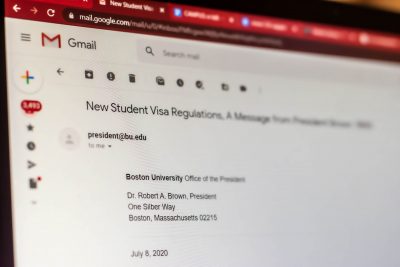
Boston University announced Thursday it is joining an amicus curiae brief in support of Harvard University and the Massachusetts Institute of Technology’s lawsuit against the U.S. Immigration and Customs Enforcement for recent federal guidance that would cause remote-learning international students to lose their student visas.
ICE had declared Monday a change to recent exemptions allowing international students to remain in the country during the COVID-19 pandemic. This will render F-1 visa holders unable to stay in the U.S. if they do not take in-person classes.
Under the new rules, international students at colleges that have announced a fully remote model of education are not the only ones at risk of deportation. At schools proceeding with hybrid or normal class schedules, international students are restricted to a maximum of one class or three credit hours online.
The University’s response, publicized via its social media platforms Thursday, included joining the amicus brief — a legal document that would allow non-litigants to offer additional information and arguments on the subject under contention — as well as instructing its lawyers to offer their services to Massachusetts Attorney General Maura Healey, who is preparing to file a lawsuit against President Donald Trump’s administration.
BU President Robert Brown also sent a letter to Chad Wolf, acting secretary of the U.S. Department of Homeland Security, calling for the guidance to be withdrawn.
Provost Jean Morrison and Willis Wang, vice president and associate provost for Global Programs, sent an email the same day to BU’s international students reaffirming a commitment to them and explaining the policy’s effects.
The University is still reviewing the ICE guidance and assessing its possible impacts on BU’s international students, BU spokesperson Colin Riley wrote in an email. However, he wrote, its role in the lawsuit could help prevent further actions that negatively impact the University’s more than 11,000 international students.
BU’s part in the amicus brief will be to provide support and evidence on how the guidance will impact the ability of international students to continue their studies and research, Riley wrote.
Riley wrote that the University’s Learn from Anywhere model fits with some of the ICE guidance, but that the school must have more certainty on the rules’ potential effects in order to provide concrete assurances to BU’s international community.
Prior to BU’s official response, rising College of Communication junior Ariane Vigna created a petition calling for BU to join Harvard and MIT’s lawsuits. Vigna said after the announcement that she is “really happy” with the University’s decision.
“We got a lot more support from domestic students and this time around, it was just overwhelming,” Vigna said. “What was really heartwarming to see wasn’t just only how BU responded, but the entire student body coming together and just overcoming any kind of cultural differences.”
Jessica Zheng, a rising junior in the College of Arts and Sciences, said she greatly appreciates the administration’s response and the fact that the community did not have to “beg” for action.
Zheng said she thinks BU should mimic what schools such as Columbia University have done: creating one credit, in-person courses for international students to sign up for, as a way to ensure protection of their F-1 visa standing.
“I would’ve liked to see more considerations for how we could improve the BU curriculum to protect international students if this still stands,” Zheng said.
Vigna, Zheng and rising CAS senior Daiki Tsumagari moderate a new Facebook group which Zheng envisioned would give international BU students their own online community and serve as a support group.
The Facebook group had about 350 members the day prior to ICE’s guidance, Zheng said, but had risen to about 600 members by Thursday.
“I would say that it’s really empowering to have those friendships and to have that huge support group now,” Vigna said. “We feel less alone and we feel very empowered.”


















































































































